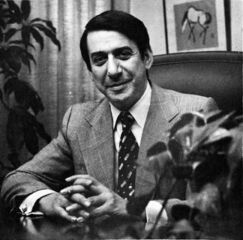Difference between revisions of "David Rosen"
From Sega Retro
(one day this will be right) |
|||
| Line 18: | Line 18: | ||
Sega wanted to go public in Japan, but the difficulties of having a foreign-owned coin-op company being publically owned meant Sega was bought by media conglomerate [[Gulf+Western]] instead. Rosen remained president and CEO of Sega during this period. | Sega wanted to go public in Japan, but the difficulties of having a foreign-owned coin-op company being publically owned meant Sega was bought by media conglomerate [[Gulf+Western]] instead. Rosen remained president and CEO of Sega during this period. | ||
| − | Rosen announced his decision to depart the company at the end of 1983, falling back into a consulting role while persuing other interests{{magref|cb|1983-11-12|32}}, with his position filled by [[Jeffrey Rochlis]]. This didn't last long, as wanting to cut down costs, Gulf+Western sold Sega to [[Bally]], | + | Rosen announced his decision to depart the company at the end of 1983, falling back into a consulting role while persuing other interests{{magref|cb|1983-11-12|32}}, with his position filled by [[Jeffrey Rochlis]]. This didn't last long, as wanting to cut down costs, Gulf+Western sold Sega to [[Bally]], leading to Rosen [[Hayao Nakayama]], [[Shoichiro Irimajiri]] and of the chairman of CSK Corporation's [[Isao Okawa]] purchasing the shares back in March 1984{{magref|nextgeneration|24|12}}. |
| − | + | Nakayama became the president of Sega, with Rosen becoming co-president. In 1986 he was also given the title of co-president of the newly formed [[Sega of America]]. | |
| − | + | Rosen remained co-chairman of Sega of America until July 15, 1996, when his resignation was announced by the company alongside [[Tom Kalinske]] and Hayao Nakayama{{magref|gamepro|97|26}}. He subsequently retired in Los Angeles, though was still abreast of Sega's business interests with the [[Sega Dreamcast]]. | |
==Magazine articles== | ==Magazine articles== | ||
Revision as of 17:18, 12 November 2018

|
| David Rosen |
|---|
| Company(ies): Sega of America |
| Role(s): Executive |
David Rosen is an American businessman who became the chief executive officer of Japanese video game company Sega in 1965. He retired from the company as Chairman in 1996.
From 1949 to 1952, Rosen served in the United States Air Force during the Korean War[1], and having spent most of his time during the conflict in Japan, founded a company called Rosen Enterprises in 1954. Among other things, Rosen Enterprises specialised in importing automated photo booths to allow the Japanese public to get photographic ID cards, later entering the entertainment market as more and more Japanese earned disposable income[1].
Shooting games imported from the US became big business thanks to Rosen Enterprises, with virtually every city in Japan getting a dedicated arcade[2]. Other companies, including Taito and Nihon Goraku Bussan (which at this point had sizable jukebox operations) attempted to enter the market, and in October 1965 it was proposed that Rosen Enterprises would merge with Nihon Goraku Bussan, creating Sega Enterprises Ltd.[3] Following the merger, Rosen became both CEO and president of the newly formed company[2].
Rosen was instrumental in forming NAMA, the first Japanese game manufacturer's assocation. He was the first chairman of the group[4].
Sega wanted to go public in Japan, but the difficulties of having a foreign-owned coin-op company being publically owned meant Sega was bought by media conglomerate Gulf+Western instead. Rosen remained president and CEO of Sega during this period.
Rosen announced his decision to depart the company at the end of 1983, falling back into a consulting role while persuing other interests[4], with his position filled by Jeffrey Rochlis. This didn't last long, as wanting to cut down costs, Gulf+Western sold Sega to Bally, leading to Rosen Hayao Nakayama, Shoichiro Irimajiri and of the chairman of CSK Corporation's Isao Okawa purchasing the shares back in March 1984[5].
Nakayama became the president of Sega, with Rosen becoming co-president. In 1986 he was also given the title of co-president of the newly formed Sega of America.
Rosen remained co-chairman of Sega of America until July 15, 1996, when his resignation was announced by the company alongside Tom Kalinske and Hayao Nakayama[6]. He subsequently retired in Los Angeles, though was still abreast of Sega's business interests with the Sega Dreamcast.
Magazine articles
- Main article: David Rosen/Magazine articles.
References
- ↑ 1.0 1.1 Next Generation, "December 1996" (US; 1996-11-19), page 9
- ↑ 2.0 2.1 Next Generation, "December 1996" (US; 1996-11-19), page 10
- ↑ Next Generation, "December 1996" (US; 1996-11-19), page 11
- ↑ 4.0 4.1 Cash Box, "November 12, 1983" (US; 1983-11-12), page 32
- ↑ Next Generation, "December 1996" (US; 1996-11-19), page 12
- ↑ GamePro, "October 1996" (US; 1996-xx-xx), page 26
| Presidents of Sega Enterprises USA |
|---|
| Gene Lipkin (1985-1986) | Ned DeWitt | Tom Petit (1988-1994) | Alan Stone (1994-1996) | Howell Ivy (1996-2004) |
Co-president: David Rosen (1985-1996) |
| Presidents of Sega of America |
| Bruce Lowry (1986-1989) | | Michael Katz (1989-1990) | Tom Kalinske (1990-1996) | Bernie Stolar (1998-1999) | Peter Moore (1999-2003) | Hideaki Irie (2003-2005) | Simon Jeffery (2005-2009) | Mike Hayes (2009-2012) | John Cheng (2012-2018) | Ian Curran (2018)
Co-president: David Rosen (1986-1996) |